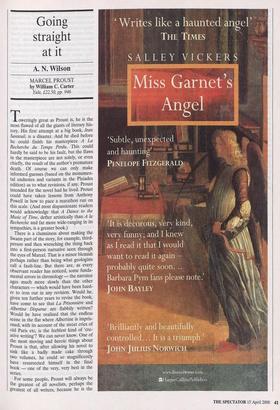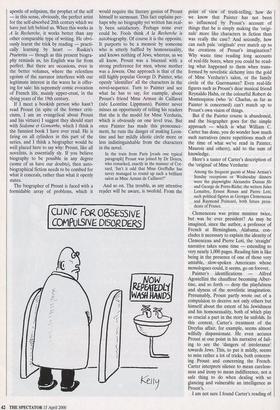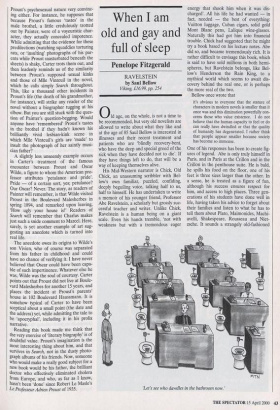Going straight at it
A. N. Wilson
MARCEL PROUST by William C. Carter Yale, £22.50, pp. 946 Toweringly great as Proust is, he is the most flawed of all the giants of literary his- tory. His first attempt at a big book, Jean Santeuil, is a disaster. And he died before he could finish his masterpiece A La Recherche du Temps Perdu. This could hardly be said to be his fault, but the flaws in the masterpiece are not solely, or even chiefly, the result of the author's premature death. Of course we can only make Informed guesses (based on the monumen- tal endnotes and variants in the Pleiades edition) as to what revisions, if any, Proust intended for the novel had he lived. Proust could have taken lessons from Anthony Powell in how to pace a marathon run on this scale. (And most dispassionate readers would acknowledge that A Dance to the Music of Time, defter artistically than A la Recherche and far more wide-ranging in its sympathies, is a greater book.) There is a clumsiness about making the Swann part of the story, for example, third- person and then wrenching the thing back into a first-person narrative seen through the eyes of Marcel. That is a minor blemish perhaps rather than being what geologists call a fault-line. But there are, as every observant reader has noticed, some funda- mental errors in chronology — the narrator ages much more slowly than the other characters — which would have been hard- er to iron out in any revision. Would he, given ten further years to revise the book, have come to see that La Prisonniere and Albertine asparue are flabbily written? Would he have realised that the endless scene in the flat where Albertine is impris- oned, with its account of the street cries of old Paris etc, is the feeblest kind of 'cre- ative writing'? We can never know. One of the most moving and heroic things about Proust is that, after allowing his novel to sink like a badly made cake through two volumes, he could so magnificently have resurrected himself in the final book — one of the very, very best in the series.
For some people, Proust will always be the greatest of all novelists, perhaps the greatest of all writers, because he is the apostle of solipsism, the prophet of the self — in this sense, obviously, the perfect artist for the self-absorbed 20th century which we have just left behind us. When this works in A la Recherche, it works better than any other comparable type of writing. He obvi- ously learnt the trick by reading — practi- cally learning by heart — Ruslcin's Praeterita — though as this present biogra- phy reminds us, his English was far from perfect. But there are occasions, even in the better volumes, where the relentless egoism of the narrator interferes with our legitimate interest in the wares he is offer- ing for sale: his supremely comic evocation of French life, mainly upper-crust, in the dying years of the 19th century.
If I meet a bookish person who hasn't read Proust (in spite of the former criti- cisms, I am an evangelical about Proust and his virtues) I suggest they should start with Sodome et Gomorrhe, which I think is the funniest book I have ever read. He is firing on all cylinders in this part of the series, and I think a biographer would be well placed here to say why: Proust, like all novelists, is essentially sly. If you believe biography to be possible in any degree (some of us have our doubts), then auto- biographical fiction needs to be combed for what it conceals, rather than what it openly states.
The biographer of Proust is faced with a formidable array of problems, which it would require the literary genius of Proust himself to surmount. This fact explains per- haps why no biography yet written has real- ly been satisfactory. Perhaps none ever could be. Fools think A la Recherche is autobiography. Of course it is the opposite. It purports to be a memoir by someone who is utterly baffled by homosexuality, and knows nothing of Jews, whereas, as we all know, Proust was a bisexual with a strong preference for men, whose mother was a Jewess. One approach is that of the still highly popular George D. Painter, who openly 'identifies' all the characters in the novel-sequence. Turn to Painter and see what he has to say, for example, about Proust's friend Mme Annan de Caillavet (née Leontine Lippmann). Painter never misses an opportunity of telling his readers that she is the model for Mme Verdurin, which is obviously on one level true. But once Painter has made this pronounce- ment, he runs the danger of making Leon- tine and her mildly idiotic circle more or less indistinguishable from the characters in the novel.
In the train from Paris [reads one typical paragraph] Proust was joined by Dr Doyen, who remarked, exactly in the manner of Cot- tard, 'Isn't it odd that Mme Greffulhe has never managed to round up such a brilliant salon as Mme Arman de Caillavet?'
And so on. The trouble, as any attentive reader will be aware, is twofold. From the point of view of truth-telling, how do we know that Painter has not been so influenced by Proust's account of things that he is simply making the 'origi- nals' more like characters in fiction than was really the case? And secondly, how can such pale 'originals' ever match up to the creations of Proust's imagination? Why waste time reading long accounts of real-life bores, when you could be read- ing what happened to them when trans- formed by novelistic alchemy into the gold of Mme Verdurin's salon, or the family circle of the Guermantes? Even real-life figures such as Proust's dear musical friend Reynaldo Hahn, or the colourful Robert de Montesquiou (who 'is' Charlus, as far as Painter is concerned) can't match up to Proust's own vision of things.
But if the Painter course is abandoned, and the biographer goes for the simple approach — which is what William C. Carter has done, you do wonder how much such narratives (mere repetitions much of the time of what we've read in Painter, Maurois and others), add to the sum of knowledge.
Here's a taster of Carter's description of the 'original' of Mme Verdurin: Among the frequent guests at Mme Annan's Sunday receptions or Wednesday dinners were the playwrights Alexandre Dumas fi/s and George de Porto-Riche; the writers Jules Lemaitre, Ernest Renan and Pierre Loti; such political figures as Georges Clemenceau and Raymond Poincare, both future presi- dents of France.
Clemenceau was prime minister twice, but was he ever president? As may be imagined, since the author, a professor of French at Birmingham, Alabama, con- cludes it necessary to explain the identity of Clemenceau and Pierre Loti, the 'straight' narrative takes some time — extending to very nearly 1,000 pages. Reading him is like being in the presence of one of those very amiable, slow-spoken Americans whose monologues could, it seems, go on forever.
Painter's identifications — Alfred Agostellini the chauffeur becoming Alber- tine, and so forth — deny the playfulness and slyness of the novelistic imagination. Presumably, Proust partly wrote out of a compulsion to deceive not only others but himself about the extent of his Jewishness and his homosexuality, both of which play so crucial a part in the story he unfolds. In this context, Carter's treatment of the Dreyfus affair, for example, seems almost wilfully dispassionate. He even accuses Proust at one point in his narrative of fail- ing to see the 'dangers of intolerance' towards Jews. This, to put it mildly, seems to miss rather a lot of tricks, both concern- ing Proust and concerning the French. Carter interprets silence to mean careless- ness and irony to mean indifference, not a safe thing to do when dealing with so glancing and vulnerable an intelligence as Proust's.
I am not sure I found Carter's reading of Proust's psychosexual nature very convinc- ing either. For instance, he supposes that because Proust's famous 'tastes' in the male brothel, a little credulously trotted out by Painter, were of a voyeuristic char- acter, they actually concealed impotence. While admitting that the evidence for these predilections (watching squaddies torturing rats, or 'insulting' photographs of his par- ents while Proust masturbated beneath the sheets) is shaky, Carter trots them out, and then leadenly reminds us of the similarity between Proust's supposed sexual kinks and those of Mlle Vinteuil in the novel, which he calls simply Search throughout. This, like a thousand other incidents in Proust's life (the death of his grandmother, for instance), will strike any reader of the novel without a biographer tugging at his elbow. But you are still stuck with the ques- tion of Painter's question-begging. Would anyone have 'remembered' Proust's tastes in the brothel if they hadn't known his brilliantly vivid lesbian-kink scene in which Mlle Vinteuil's girls are 'made' to insult the photograph of her saintly musi- cian father?
A slightly less unseemly example occurs in Carter's treatment of the famous encounter between Proust and Oscar Wilde, a figure to whom the American pro- fessor attributes 'petulance and pride'. Pride — of a certain sort, yes; petulance? Our Oscar? Never. The story, as readers of Painter will remember, is that Wilde visited Proust in the Boulevard Malesherbes in spring 1894, and remarked upon leaving, 'How ugly your house is!' Readers of Search will remember that Charlus makes Just such a snide comment to Marcel. Here, surely, is yet another example of art sug- gesting an anecdote which is turned into real life.
The anecdote owes its origins to Wilde's son Vivien, who of course was separated from his father in childhood and could have no chance of verifying it. I have never believed that Oscar could have been capa- ble of such impertinence. Whatever else he was, Wilde was the soul of courtesy. Carter points out that Proust did not live at Boule- vard Malesherbes for another 15 years, and places the incident at Proust's parents' house in 102 Boulevard Haussmann. It is somehow typical of Carter to have been sceptical about a small point (the date and the address) yet, while admitting the tale to be 'apocryphal', including it in his prolix narrative.
Reading this book made me think that the very exercise of 'literary biography' is of doubtful value. Proust's imagination is the most interesting thing about him, and that survives in Search, not in the dusty photo- graph albums of his friends. Now, someone who would make a really good subject for a new book would be his father, the brilliant doctor who effectively eliminated cholera from Europe, and who, as far as I know, hasn't been 'done' since Robert Le Masle's Le Professeur Adrien Proust of 1935.




































































 Previous page
Previous page